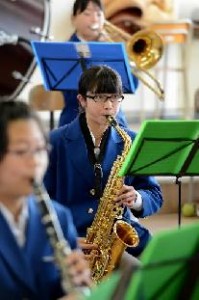Two years in the lives of children: Evacuees from Fukushima, Part 2
Mar. 22, 2013
A place where she belongs
No more tears: Immersed in band activities
Support of mother, sister through unhappy times
by Takamasa Kyoren, Staff Writer
Riina Miura, 13, a member of the band at Yano Junior High School in Hiroshima’s Aki Ward, loves the feeling she gets when the sounds of all the instruments come together. She sways to the music as she plays her sax, keeping her eye on the band director’s baton.
“I’ve found something I want to do, so I don’t want to go back to Iwaki,” Riina said when the after-school band practice had ended.
Riina came from Iwaki in Fukushima Prefecture to live with her grandmother in Aki Ward three days after the explosions at the Fukushima No. 1 (Daiichi) nuclear power plant. Riina’s parents were worried about the health of their three daughters, but the company they ran was destroyed in the disaster and they could not leave Iwaki. It was decided that for the time being the children only would go to live with their grandmother in Hiroshima. At the time, Riina was in the sixth grade, her sister Yuna was in the fourth grade, and their little sister Aina was 4 years old.
But after coming to Hiroshima Riina gradually became depressed. She first attended Funakoshi Junior High school near her grandmother’s home. One day in May, as she gazed out the window during math class, tears began to stream down her cheeks. The teacher quietly took Riina out of the classroom and asked her if she wanted to go home. She nodded with tear-filled eyes.
Soon after she entered the school, Riina was happy to find that her classmates struck up conversations with her. Her teachers were kind too. But the band at her elementary school in Iwaki had been aiming for the national competition, and Riina didn’t know what to do with herself after school in Hiroshima. “I suddenly had nothing to feel passionate about,” she said.
All sorts of feelings welled up in her: loneliness, sadness, helplessness. She often left school early or took refuge in the nurse’s office. At home, thinking back on her elementary school days when she was so involved in the band, she would cry alone.
It was a little push from her mother Aya, 40, and a teacher at Funakoshi Junior High that brought about a change in Riina. In the fall of 2011, eight months after she moved to Hiroshima, Aya, who was by then living with her daughters, talked to Riina’s teacher and Riina was able to observe band practice at nearby Yano Junior High School.
When Riina saw the band members’ serious expressions and their energy, her old feeling came back. “This is it,” she thought to herself. Handed her sax, she sat in with the band. She told her mother how excited she was. “That’s what I want to do,” she said. “I won’t cry anymore, so please let me join the band.” Three weeks later she transferred to Yano Junior High.
Riina was suddenly very busy, and her sister Yuna, 12, who is two years younger, was glad to see her looking happy again. “It wasn’t like Riina to be crying all the time,” she said.
But Yuna had worries of her own. “If I’m going to go back to Iwaki, now is the time,” she thought as she prepared to enter junior high school. But poor Riina would have to change schools again. And if Riina had to stay behind in Hiroshima by herself she would be lonely. After giving it some thought, Yuna decided to stick it out in Hiroshima a little longer. Aya will never forget when Yuna said to her: “I wanted to go back, but it wasn’t really possible.”
“Since we came to Hiroshima the girls are really considerate of each other because Riina was so good about looking out for her little sisters,” Aya said.
In February of this year, Riina became vice president of the school band. Practice is tough and she sometimes cries. But it’s not like the days when she went off to cry by herself. “I want to improve along with everyone else. And starting this spring I’ll be with Yuna.” In April Yuna will enter Yano Junior High and join the band. Riina can’t wait for spring.
(Originally published on March 12, 2013)








